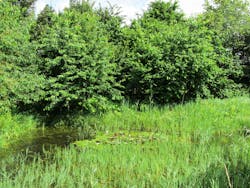EPA Settles Central Valley Wetlands Destruction Case
The U.S. Environmental Protection Agency and the U.S. Department of Justice announced a settlement with the owners of Anchordoguy ranch for violations of the Clean Water Act that destroyed more than 80 acres of rare vernal pool wetlands and streams in Tehama County, Calif. Ranch owners agreed to pay $795,000 for wetlands preservation and $300,000 in penalties.
Matthew Anchordoguy, John Barlow, and Anchordoguy & Co.y LP own and operate the 1,036-acre Anchordoguy ranch in Tehama County. Coyote Creek, a tributary of the Sacramento River, crosses the ranch, where vernal pools and other wetlands and small seasonal streams could be found.
Between 2008 and 2010, the owners illegally deep-ripped 872 acres of the ranch to make room for more orchards, destroying 80 acres of vernal pool wetlands and damaging two acres of Coyote Creek. The ranch owners carried out these activities without a required Clean Water Act 404 permit from the U.S. Army Corps of Engineers.
In addition to paying $300,000 in civil penalties, the ranch owners are required to offset the ecological losses of the destroyed vernal pool wetlands and streams. Ranch owners have agreed to provide $795,000 to The Nature Conservancy to preserve vernal pool and salmon habitats in the Sacramento River watershed. This funding will include the purchase of a conservation easement on the 515-acre Foor Ranch, a unique piece of property rich in vernal pool wetlands and connected to the Vina Plains preserve, a much larger vernal pool conservation area.
The Foor Ranch conservation easement will complete one of the last pieces of the Conservancy’s 4,600-acre Vina Plains Preserve, a prime vernal pools and grasslands conservation, research and educational site on the upper terrace of the Sacramento Valley. The Vina Plains vernal pools are some of the best remaining in California.
Vernal pools are shallow depressions with an underlying layer of impermeable subsoil, which fill with water during the rainy season. These seasonal wetlands look barren during the summer and fall, but after winter rains begin they are home to endangered and threatened fairy shrimp and native and migratory birds that feed on the shrimp. In the spring the vernal pools bloom with uniquely adapted wetland plants creating rings of colorful wildflowers at the pools' edges as the water recedes.
California is one of the few places in the world where vernal pool ecosystems are found. Once common in the Central Valley, vernal pools have been reduced to less than 10% of their original range. Vernal pools and other wetlands help moderate seasonal flooding during storm events and also remove contaminants from the water, including agricultural and urban runoff.
The proposed settlement is subject to a 30-day public comment period and final court approval.
Source: EPA


